人教新课标高一必修3 Unit 1 Festivals around the world单元复习课件(78张)
文档属性
| 名称 | 人教新课标高一必修3 Unit 1 Festivals around the world单元复习课件(78张) |
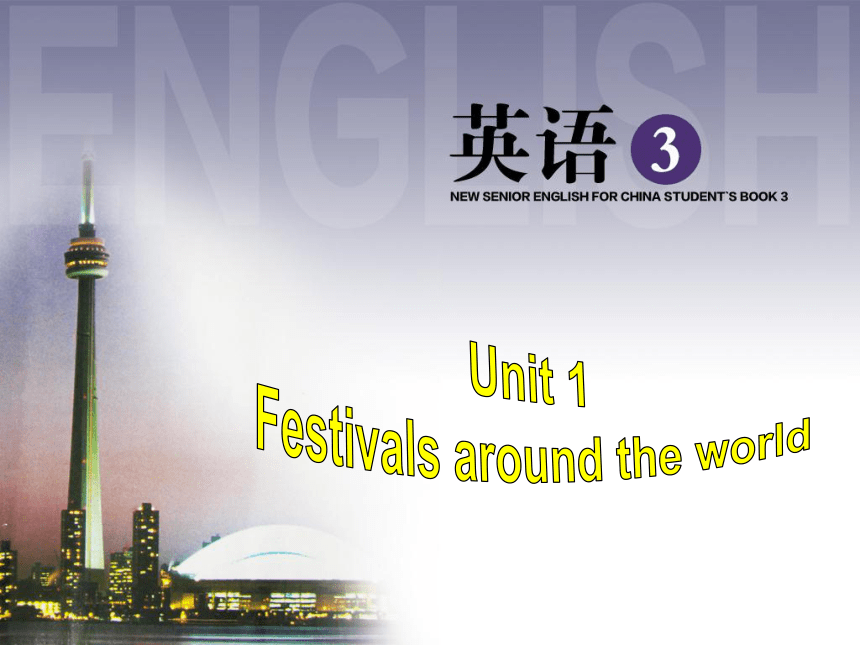
|
|
| 格式 | zip | ||
| 文件大小 | 1.6MB | ||
| 资源类型 | 教案 | ||
| 版本资源 | 人教版(新课程标准) | ||
| 科目 | 英语 | ||
| 更新时间 | 2017-01-17 00:00:00 | ||
图片预览

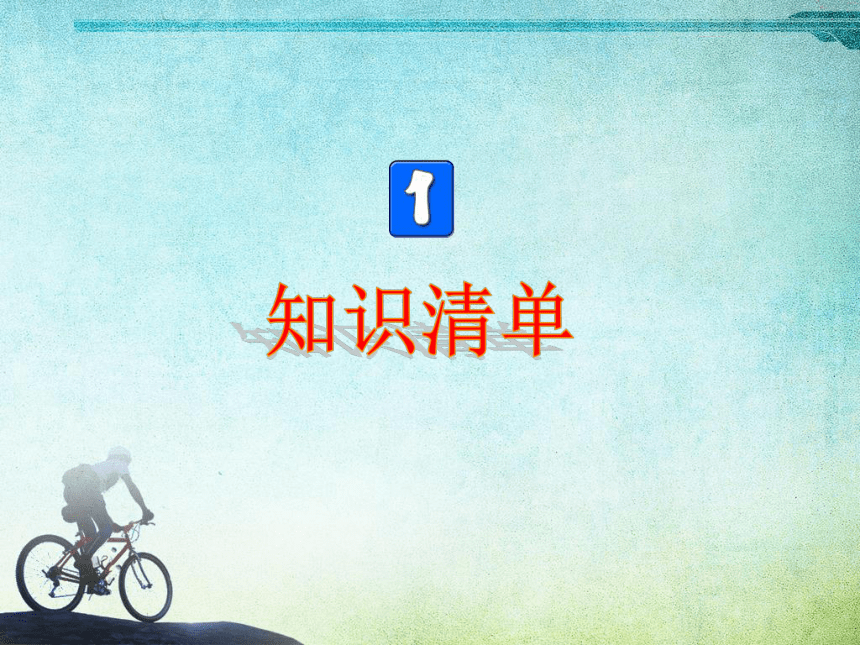
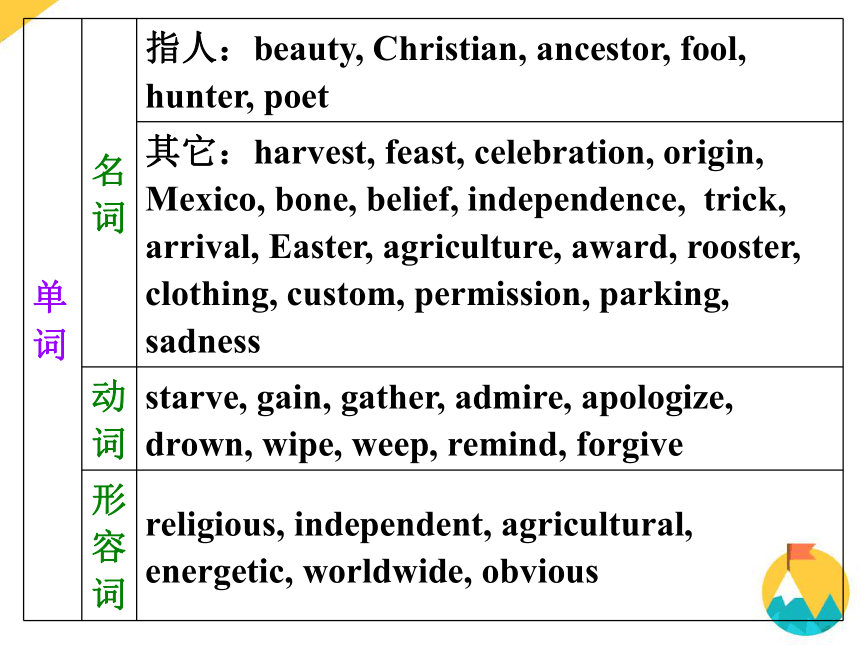
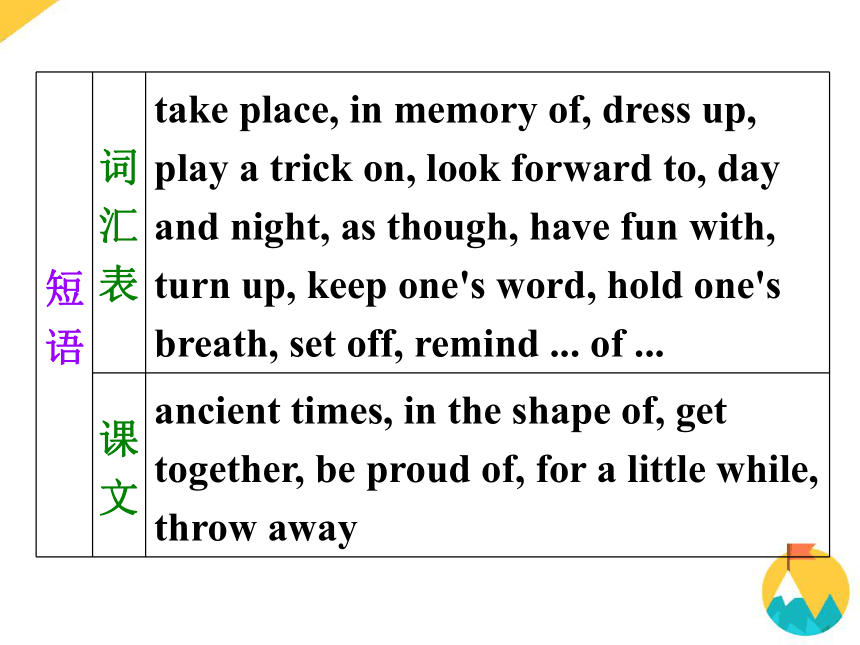
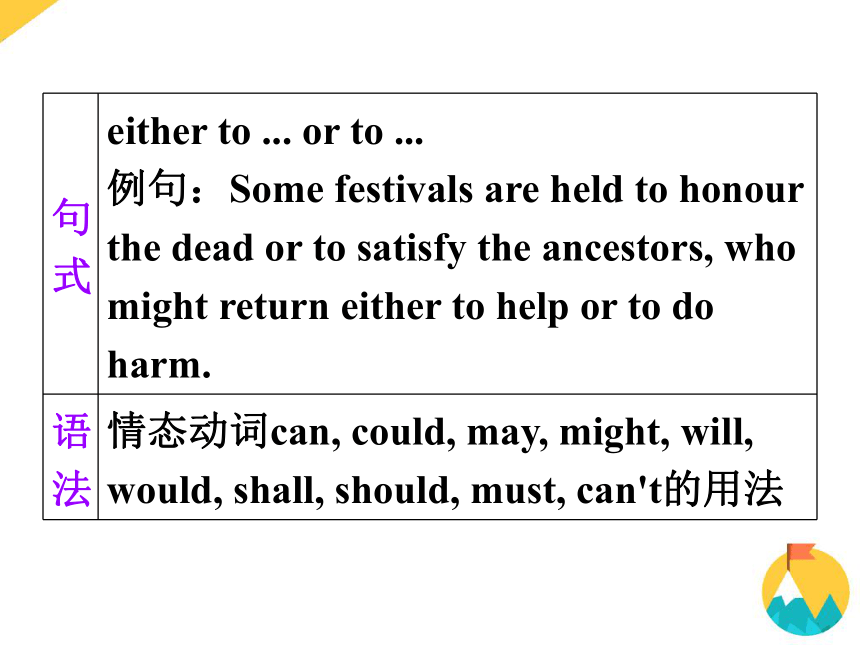
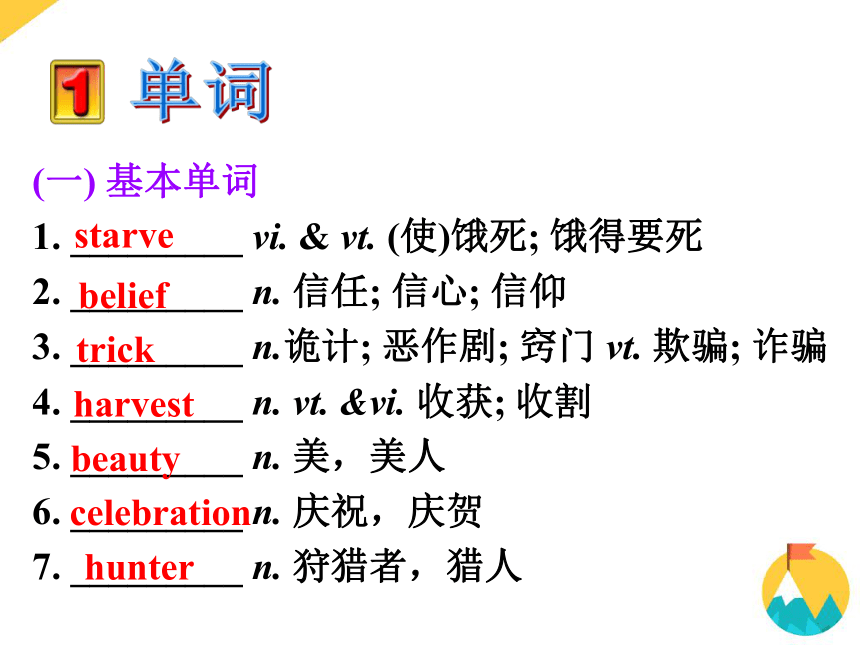
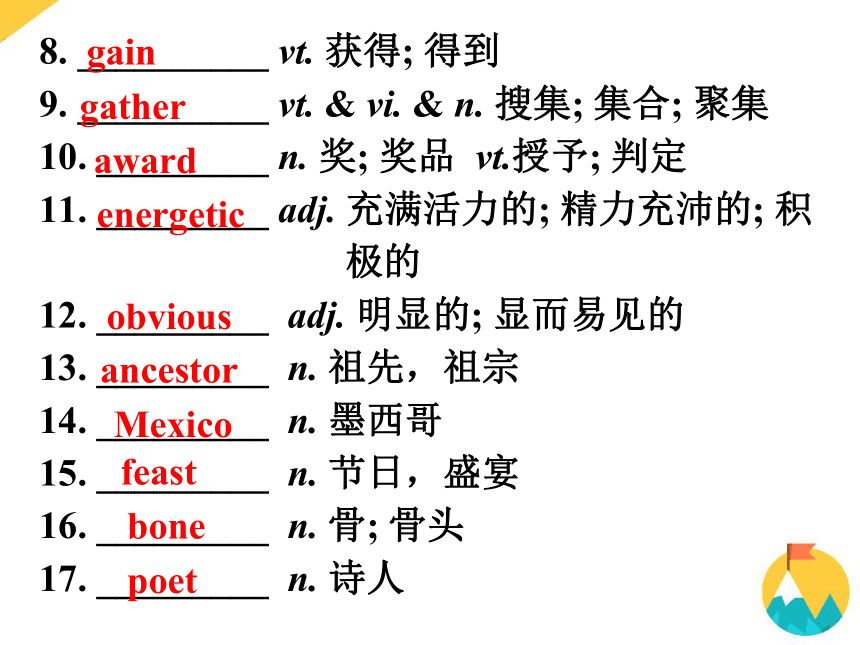
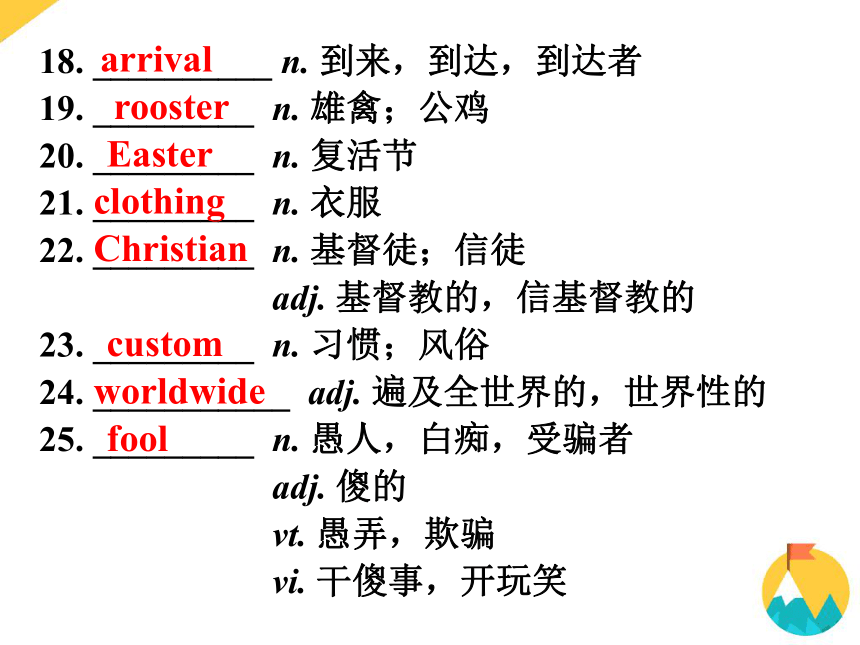
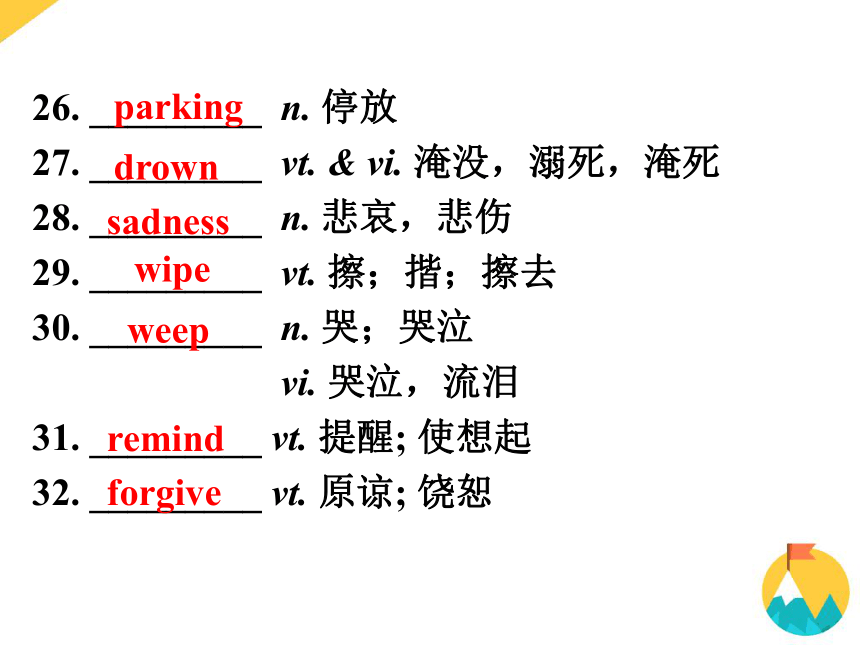
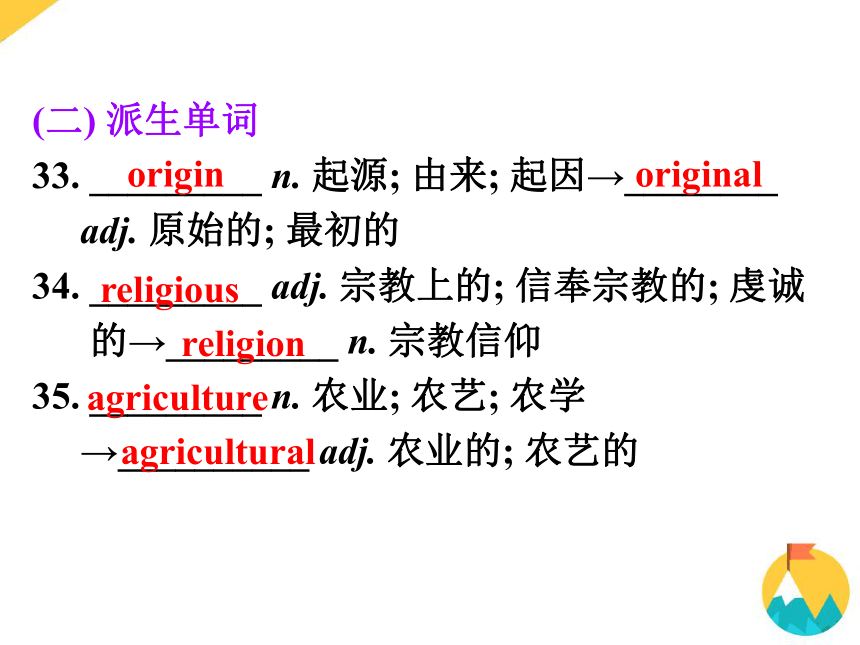
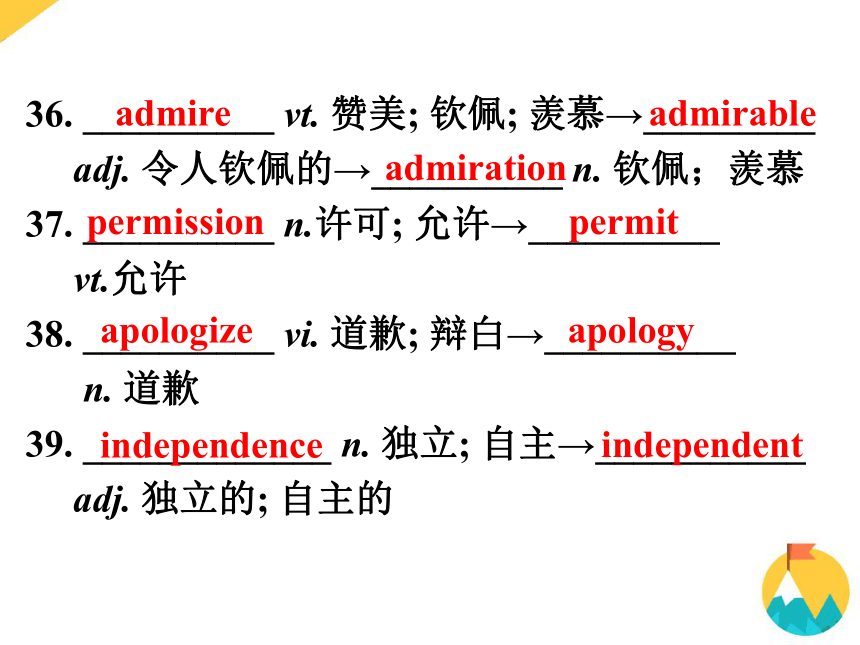
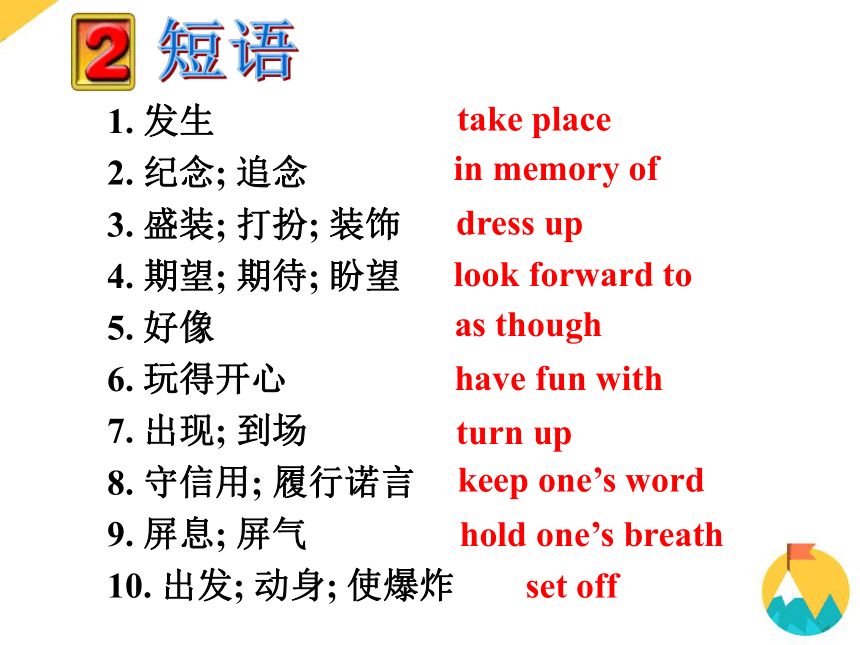
文档简介
课件78张PPT。Unit 1
Festivals around the world知识清单(一) 基本单词
1. _________ vi. & vt. (使)饿死; 饿得要死
2. _________ n. 信任; 信心; 信仰
3. _________ n.诡计; 恶作剧; 窍门 vt. 欺骗; 诈骗
4. _________ n. vt. &vi. 收获; 收割
5. _________ n. 美,美人
6. _________ n. 庆祝,庆贺
7. _________ n. 狩猎者,猎人starvebelieftrickharvestbeautycelebrationhunter单词8. __________ vt. 获得; 得到
9. __________ vt. & vi. & n. 搜集; 集合; 聚集
10. _________ n. 奖; 奖品 vt.授予; 判定
11. _________ adj. 充满活力的; 精力充沛的; 积
极的
12. _________ adj. 明显的; 显而易见的
13. _________ n. 祖先,祖宗
14. _________ n. 墨西哥
15. _________ n. 节日,盛宴
16. _________ n. 骨; 骨头
17. _________ n. 诗人gaingatherawardenergeticobviousancestorMexicofeastbonepoet18. __________ n. 到来,到达,到达者
19. _________ n. 雄禽;公鸡
20. _________ n. 复活节
21. _________ n. 衣服
22. _________ n. 基督徒;信徒
adj. 基督教的,信基督教的
23. _________ n. 习惯;风俗
24. ___________ adj. 遍及全世界的,世界性的
25. _________ n. 愚人,白痴,受骗者
adj. 傻的
vt. 愚弄,欺骗
vi. 干傻事,开玩笑EasterarrivalroosterclothingChristiancustomworldwidefool26. _________ n. 停放
27. _________ vt. & vi. 淹没,溺死,淹死
28. _________ n. 悲哀,悲伤
29. _________ vt. 擦;揩;擦去
30. _________ n. 哭;哭泣
vi. 哭泣,流泪
31. _________ vt. 提醒; 使想起
32. _________ vt. 原谅; 饶恕sadnessparkingdrownwiperemindweepforgive(二) 派生单词
33. _________ n. 起源; 由来; 起因→________
adj. 原始的; 最初的
34. _________ adj. 宗教上的; 信奉宗教的; 虔诚
的→_________ n. 宗教信仰
35. _________ n. 农业; 农艺; 农学
→__________ adj. 农业的; 农艺的originagricultureagriculturaloriginalreligiousreligion36. __________ vt. 赞美; 钦佩; 羡慕→_________
adj. 令人钦佩的→__________ n. 钦佩;羡慕
37. __________ n.许可; 允许→__________
vt.允许
38. __________ vi. 道歉; 辩白→__________
n. 道歉
39. _____________ n. 独立; 自主→___________
adj. 独立的; 自主的admireadmirableadmirationpermissionpermitapologizeapologyindependenceindependent1. 发生
2. 纪念; 追念
3. 盛装; 打扮; 装饰
4. 期望; 期待; 盼望
5. 好像
6. 玩得开心
7. 出现; 到场
8. 守信用; 履行诺言
9. 屏息; 屏气
10. 出发; 动身; 使爆炸 take placein memory ofdress uplook forward toas though have fun withturn upkeep one’s wordhold one’s breathset off短语核心要点1. starve vi.& vt. (使)饿死; 饿得要死; 渴望;
极需要
(课文原句) At that time people would starve if food was difficult to find, especially during the cold winter months.
翻译:在那个时代,如果食物难以找到,特别是寒冷的冬月,人们就会挨饿。单词【归纳】
starve for sth. (急)需要…
starve to death 饿死
starve sb. into (doing) sth.
以饥饿迫使某人 (做)某事
【拓展】
be starved to death 饿死
starve for, ache for, die for, hunger for, long for, sigh for, thirst for
渴望得到......, 渴望做......2. gain v. 获得; 得到 n. 利润;利益
(课文原句) India has a national festival on October 2 to honour Mohandas Gandhi, the leader who helped gain India’s independence from Britian.
翻译: 印度在10月2日有个全国性节日,纪念汉达斯·甘地,他是帮助印度脱离英国而独立的领袖。【归纳】
gain from/ by... 从……获益
gain two minutes (钟表)走快两分钟
gain one’s living 谋生
gain weight 体重增加 【辨析】acquire/ get/ gain/ earn/ obtain
acquire宾语多为知识/ 技能等;
earn宾语多为金钱/ 荣誉等理应得到的东西;
obtain宾语多为期望已久的东西;
gain宾语多为经验/ 利益/ 优势/ 好处等;
win宾语则为比赛/ 战斗等;
get宾语较广泛, 既可是具体的东西, 也可是抽象的事物。After four years’ study, I acquired a good knowledge of computer and my perseverance won me many friends in the university. Therefore I got a good job, which has made me gain much experience. And now I earn up to $100, 000 a year. 经过四年的学习, 我获得了丰富的电脑知识。在大学里, 我的毅力为我赢得了很多朋友。因此, 我找到了一份好工作, 这项工作使我得到了很多的经验。现在, 我每年能够赚得100 000美元。【即时运用】
用acquire/get/gain的适当形式填空。
1) She _________ a knowledge of English by careful study.
2) He _________ what he wanted by the time he graduated.
3) They ________ the victory after a bloody battle.acquiredhad gotgained单句改错。
He gained excellent sums of money by acting.
通过表演, 他赚了不少钱。
分析:表示“赚得, 赢得”, 而gain表示“通过努
力而获得有利的东西”,这里赚钱用earn。earned3. award
【归纳】
v. “授予,判定”,award sb. sth. 或 award sth. to sb.,“授予某人某物”。
n. “奖,奖品”,可与介词for连用,receive / win/ get an award for sth.。
(课文原句) Some people might win awards for
their farm produce, like the biggest
watermelon or the most handsome rooster.
翻译:有些人还可能因为他们的农产品(参加
各种评选)而获奖,比如最大的西瓜或最帅的
公鸡。【辨析】award, reward, prize
award 经过正式裁定而给予的荣誉,或在竞赛中获胜而得到的奖赏。
reward 对某人所做的某件好事、好的行为等的报答、酬谢。
prize 在竞赛中获胜或有特殊贡献时所得的奖励。4. admire vt. 赞美; 钦佩; 羡慕
(课文原句) China and Japan have mid-autumn festivals, when people admire the moon and in China, enjoy mooncakes.
翻译:中国和日本都有中秋节,这时人们会赏月。在中国,人们还品尝月饼。【归纳】
admire sb. for sth. 因某事而钦佩某人
【拓展】
admiration n. 赞美; 钦佩
express/ have admiration for sb./ sth.
(表示) 羡慕/ 钦佩某人/ 物
with/ in admiration 钦佩地
admirable adj. 可钦佩的; 极佳的The admirers admire the famous actor for his excellent performance, which they enjoy with/in admiration, and because of having admiration for him, some of them even email him frequently.
这些羡慕者因这位著名演员的出色表演而钦佩他。他们带着钦佩之情欣赏他的表演。一些追求者因为钦佩他甚至经常给他发邮件。【辨析】admire/ honour/ respect/ regard
均含“尊重/钦佩”之意。
admire 侧重指对某人或某物的仰慕, 钦佩, 并含
欣赏爱慕之情。
honour 侧重指对某人或某物表示极大的敬意。
respect 指对人的行为/品德/才华或成就等仰慕尊
重,尤指对年长或地位高的人的尊敬。
regard 正式用词, 需用修饰语加强或明确其意。5. apologize vi. 道歉; 辩白
(课文原句) Well, he was not going to hold his breath for her to apologize.
翻译:他不想屏息等她来道歉。 【归纳】
apologize to sb. for (doing) sth.
因(做)某事向某人道歉
apologize to sb.+that 从句 向某人道歉
【拓展】
make an apology to sb. for sth.
因某事向某人道歉
accept/refuse one’s apology
接受/拒绝某人的道歉6. remind vt. 提醒; 使想起
(课文原句) I don’t want them to remind me of her.
翻译:他不想因它们想起她来。【归纳】
remind sb. of sth. 提醒某人某事
remind sb.to do sth. 提醒某人做某事
remind (sb.) that/ how/ what 从句
提醒……remind sb. to do, remind sb. of doing
remind接双宾语时其直接宾语可以是动词不定式, 也可以是介词短语“of+ v-ing ”。区别是: 前者指将来发生的事情, 而后者指过去发生过的事情。如:
He reminded me to answer the letter.
他提醒我回这封信。
He reminded me of my answering the letter.
他提醒我已经回过这封信了。7. forgive (forgave, forgiven) vt.& vi.
(课文原句) She would never forgive him.
翻译:她恐怕永远也不会原谅他了。【归纳】
forgive sb. sth. 原谅某人某行为
forgive me 请原谅; 对不起
forgive one’s doing sth. 原谅某人做了某事
forgive sb. for (doing) sth.
原谅某人(做了)某事1. look forward to 期望; 期待; 盼望
(课文原句) The most energetic and important festivals are the ones that look forward to the end of winter and to the coming of spring.
翻译:最富生气而又最重要的节日,就是告别冬天、迎来春天的日子。短语【拓展】
look into sth. 调查某事
look down on/upon 瞧不起; 看不起
look on...as... 把……看作……
look over 检查
look through 浏览; 仔细查看
look out 当心; 小心to后接动词-ing形式还有:
pay attention to, be/become/get used to, be devoted to, get down to, be due to 由于
see to 照料, 注意,
feel equal to 能信任
in addition to, admit to, be familiar to, find one’s way to 设法达到
give way to 对……让步
give one’s mind to 专心于keep to 坚持
look up to 尊敬
lead to, object to/be opposed to 反对
stick to, stand up to 勇敢面对
be sentenced to 被判刑
refer to 谈及, 查阅, 参考等2. turn up 出现; 到场; 开大; 调高; 被发现
(课文原句) It was Valentine’s Day and Hu Jin had said she would meet him at the coffee shop after work. But she didn’t turn up.
翻译:这天是情人节,胡瑾说她下班后会在咖喱馆和他见面的。可现在她却不见人影。Don’t?worry.?I’m?sure?your?missing?glasseswill?______?sooner?or?later. (2015湖北卷)
A. stand?out?????? B. break?up?????????
C. get?out??????? D. turn?up
考点:动词短语辨析
句意:别担心。我相信你丢失的眼镜迟早会出现的。
A项“突出”;B项“结束,解散,分手”;C项“出去,出版,被泄露”;D项“出现,露面”。故选D项。?D【拓展】
turn on 打开
turn in 上交; 告发
turn out 结果是; 生产; 制造; 赶走
turn off 关掉
turn down 关小; 拒绝
turn to 转向; 求助于
turn facts upside down 颠倒是非
turn for the better 好转3. keep one’s word 守信用; 履行诺言
(课文原句) She said she would be there at seven o’clock, and he thought she would keep her word.
翻译:她说她会在七点到达,他(李方)认为她会守信用的。【拓展】
in other words 换句话说
in a word 总之; 简言之
break one’s word 失信,食言
in words 用语言;口头上
get in a word 插嘴
have a word with sb. 和某人说句话
key words 关键字4. hold one’s breath 屏息; 屏气
(课文原句) Well, he was not going to hold his breath for her to apologize.
翻译:他不想屏息等她来道歉。
【拓展】
take a deep breath 深呼吸
lose one’s breath 喘不过气来
out of breath 气喘吁吁
catch one’s breath 恢复正常呼吸【即时应用】
完成句子。
When we climbed to the top of the ten-story
building, we ________________ (上气不接下气).
(2) If you run very fast, you must _______________ (喘不过气来).were out of breath lose your breath1. It was obvious that the manager of the
coffee shop was waiting for Li Fang to
leave...
很明显, 咖啡馆的经理在等李方离开…
it作形式主语, 代指that引导的主语从句。句式It作形式主语的常用句式:
① It be+形容词 (possible, strange, natural,
important...)+that从句
② It be+过去分词 (said, thought, believed,
supposed, reported...)+that从句
③ It+不及物动词 (seem, occur, happen...)+that从句
④ It be+名词短语 (a pity, a fact, a wonder, an honour, no wonder...)+that从句语法一、may和might
都可表示允许。如:
You may/ might use my dictionary so long as you return it before 17:00.
表示可能,might比may语气更不确定,表示的可能性更小。如:
Do you think Mr. Jackson may/ might be here on time? 情态动词(一)二、can和could
都可表示能力。如:
Even a small personal computer can store great amounts of information.
I couldn’t get tickets; they were sold out.
可表示许可,could比can语气更委婉。如:
You can have my seat. I’m going now.
Could I have a drink of water, please???? 表示说话人的猜测,此时could不是can的过去式,表示推测的可能性比can小。如:
Can he still be alive after all this time??
If you’re not careful, you could get into even worse trouble.?三、will和would
表意愿,will表现在意愿,可用于条件句
中,would表示过去意愿(如表现在的意
愿,语气较委婉)。如:
Ask, if you will, who the owner is.?????
My friend asked if I would go with him.
都可表征求意见或提出请求。如:
Will/ Would you please make a cup of coffee for me?都可表习惯和倾向性,will表现在的习
惯,would表过去的习惯。如:
These clothes won’t wash easily.
When Ann was a child, she would often ask some strange questions.四、shall和should
shall在疑问句中用于征求对方意见,主要用于第一人称,也可用于第三人称,“要不要,……好吗”;在陈述句中表示说话者的允诺、告诫、威胁、命令、规定、必然性等,主要用于第二或第三人称。如:
Shall we go out and have a walk after dinner?
Shall my sister come here now?
You shall do as you see me do.
Tell Betty that she shall have the bike tomorrow. should表示义务或责任、建议或劝告、推断等。如:
We should take good care of our children.
You should give up smoking and drinking.
With an early start the young men should be here by 10:00 am.五、must和can’t
must表示“必须做某事”,还可表推测。
如:
All passengers must wear seat belts.
Your father has worked hard all day. He must be tired.
When you got lost in the forest, you must have been very frightened. can’t表否定的推测和判断,“不可能”。
如:
If Jim didn’t leave home until six o’clock, he can’t be at the office yet.
Somebody must have opened the cage because the lion can’t have escaped on its own.用适当的情态动词补全对话。
Tom: It’s raining hard. _______ you mind sharing your umbrella with me?
Rose: Of course not. By the way, one of our rules is that every student _____ wear school uniform while at school, right?
Tom: Yes. You must be a newcomer here.
Rose: That’s true. I moved here last Monday. Are you going to see the film in our school tonight? WouldshallTom: Yes. Our foreign teacher __________ come with us tonight, but he isn’t sure. He may be at his office. Let’s ask him to go with us.
Rose: I saw him leave his office half an hour ago. He _____ be working there at this time. I hear you’ve got a lot of valuable Australian coins. ____________________ I have a look?may/ mightcan’t?May/Might/Can/CouldTom: What a pity! My father requires that they _______ not be brought to school.
If you’re free, I will show you them at my home next Monday.
Rose: Wonderful. Where were you last Saturday night? I knocked at the door of your dorm, but nobody answered it. shouldTom: I was tired after a long hike. Therefore, I ______ have been asleep.
Rose: I’ve heard that my friend Joe met with an accident during the trip.
Tom: Don’t worry; he __________ not have been hurt seriously. He will leave hospital early next Monday. mustmay/might Rose: I _______________________ have paid a visit to him last Sunday, but something unexpected happened.
Tom: We can go to the hospital to visit him this Sunday Morning.
Rose: Fine.could/would/should/might 1. It was so noisy that we ____ hear ourselves speak. (2015浙江)
A. couldn’t B. shouldn’t
C. mustn’t D. needn’t
2. You ____ be careful with the camera. It costs! (2015四川)
A. must B. may C. can D. will高考链接AA3. You ____ feel all the training a wasted of time, but I’m hundred percent sure later you’ll be grateful you did it. (2015陕西)
A. should B. Need C. shall D. may
4. —Can’t?you?stay?a?little?longer??
—It’s?getting?late.?I?really?____ go now, My?daughter?is?home?alone.?? (2015北京)
A. may??? B. can? ?C.?must?? D. dare??D C 写作续写是根据所提供的材料,展开合理、充
分的想象,构思适当情节,对原文延伸。
续写的要求:
1. 在读懂原文基础上,以原文内容为起点,写出故事情节的发展和变化;
2. 续写的内容要有明确的中心或主题,做到合情合理、真实生动;
3. 续写文章要在主要人物思想行为、性格特点、语言特点和风格上与原文保持一致。如何续写故事结尾续写注意事项:
1. 展开想象,合理推测情节的发展。
展开想象是对原文故事没有写出的情节展开合理的推想,从多角度去想象,想象出几种情况,几种结果,从中加以选择。
2. 前后照应,防止自相矛盾。
续写要注意前后照应,防止自相矛盾,要与上文紧密联系,使上下文融为一体。【写作任务】
根据课本第7页上的课文A SAD LOVE STORY用英语续写一篇短文。
注意:1. 写出两个人的误会和前后态度的变化以及故事的结局;2. 词数120左右。
_______________________________________
_______________________________________
_______________________________________
_______________________________________【参考范文】
????? ... All thoughts rushed into Li Fang’s head at the same time. “What should I say? She must have got the wrong place.” Finally he decided to tell her the truth. “Forgive me, honey! Nothing unusual happened to me! I had been waiting for you in the coffee shop since 7 o’clock. Thinking you could not love me, I was so heart-broken that I threw the chocolates and roses away. You know I love you so much. Can you give me another chance? I’ll buy you the most beautiful roses and the sweetest chocolates,” Li Fang said honestly.
???? “I don’t need any chocolates or roses. If only you would stay with me forever! Your honesty is the best gift for me,” Hu Jin said. They walked down the street hand in hand.巩固练习I. 用括号内单词的正确形式填空。
1. I must _________ (apology) for not being able to meet you.
2. You must ask __________ (permit) before taking any photographs inside the church.
3. Only the timely _______ (arrive) of the police prevented the situation from becoming worse.apologizepermissionarrival4. Parents should encourage ____________ (independent) in their children.
5. Large families are more common in traditional ___________ (agriculture) societies than in cities.
6. The more the young students worked, the more ________ (energy) they became.independenceagriculturalenergeticII. 用适当的情态动词填空。
1. It ________ (might / must) not be a bad idea to get a car alarm for your new sports car. New cars tend to attract thieves.
2. Eva _____ (will / would) keep talking unless you tell her to shut up.
3. You ________ (can / must) have stayed up all night. You look so tired.
4. They ________ (should / may) have arrived at 6 am but their flight was delayed because of the storm.mightwillmust?should?5. If you ________ (would / must) smoke, please go out on the balcony.
6. I'm going to?Europe?on vacation if I ________ (can / might) find the money.
7. One school rule says that every student ________ (shall / could) wear school uniform on Monday.
8. I ________ (won't / can't) thank you too much for all your help.?mustcan?shallcan’tIII.?阅读材料,在空白处填入适当的内容。
The?Cannes?Film Festival 1. ________ (hold) every year in May in the city of?Cannes?on the southeast coast of?France. The first festival, 2. ________ took place in 1946, was not really a competition but rather a(n) 3. _____________ (celebrate) of the art of film making. is held? ???whichcelebrationLater, the festival became more about 4. _________ (advance) the film industry. 5. ________ (usual) art films as well as films made by independent studios still do well at the festival and can even gain awards. Introduced in 1955, the Palme d'Or or Golden Palm award 6. _____ the best film at the festival is now considered one of the top prizes in the world among film makers and films that win the award are 7. ________ (deep) admired worldwide. advancingUnusualfordeeplyThough most of the winners of the Palme d'Or have been films fromWestern Europe, many films from 8. ________ parts of the world such as?India,?China,?Thailand,?Brazil?and?Iran?have also been awarded the prize. The winner of the 2014 Palme d’Or was the Turkish film?Winter Sleep?9. ________ (direct) by Nuri Bilge Ceylan. It 10. _______ (last) more than three hours and is well worth seeing. otherdirectedlasts
Festivals around the world知识清单(一) 基本单词
1. _________ vi. & vt. (使)饿死; 饿得要死
2. _________ n. 信任; 信心; 信仰
3. _________ n.诡计; 恶作剧; 窍门 vt. 欺骗; 诈骗
4. _________ n. vt. &vi. 收获; 收割
5. _________ n. 美,美人
6. _________ n. 庆祝,庆贺
7. _________ n. 狩猎者,猎人starvebelieftrickharvestbeautycelebrationhunter单词8. __________ vt. 获得; 得到
9. __________ vt. & vi. & n. 搜集; 集合; 聚集
10. _________ n. 奖; 奖品 vt.授予; 判定
11. _________ adj. 充满活力的; 精力充沛的; 积
极的
12. _________ adj. 明显的; 显而易见的
13. _________ n. 祖先,祖宗
14. _________ n. 墨西哥
15. _________ n. 节日,盛宴
16. _________ n. 骨; 骨头
17. _________ n. 诗人gaingatherawardenergeticobviousancestorMexicofeastbonepoet18. __________ n. 到来,到达,到达者
19. _________ n. 雄禽;公鸡
20. _________ n. 复活节
21. _________ n. 衣服
22. _________ n. 基督徒;信徒
adj. 基督教的,信基督教的
23. _________ n. 习惯;风俗
24. ___________ adj. 遍及全世界的,世界性的
25. _________ n. 愚人,白痴,受骗者
adj. 傻的
vt. 愚弄,欺骗
vi. 干傻事,开玩笑EasterarrivalroosterclothingChristiancustomworldwidefool26. _________ n. 停放
27. _________ vt. & vi. 淹没,溺死,淹死
28. _________ n. 悲哀,悲伤
29. _________ vt. 擦;揩;擦去
30. _________ n. 哭;哭泣
vi. 哭泣,流泪
31. _________ vt. 提醒; 使想起
32. _________ vt. 原谅; 饶恕sadnessparkingdrownwiperemindweepforgive(二) 派生单词
33. _________ n. 起源; 由来; 起因→________
adj. 原始的; 最初的
34. _________ adj. 宗教上的; 信奉宗教的; 虔诚
的→_________ n. 宗教信仰
35. _________ n. 农业; 农艺; 农学
→__________ adj. 农业的; 农艺的originagricultureagriculturaloriginalreligiousreligion36. __________ vt. 赞美; 钦佩; 羡慕→_________
adj. 令人钦佩的→__________ n. 钦佩;羡慕
37. __________ n.许可; 允许→__________
vt.允许
38. __________ vi. 道歉; 辩白→__________
n. 道歉
39. _____________ n. 独立; 自主→___________
adj. 独立的; 自主的admireadmirableadmirationpermissionpermitapologizeapologyindependenceindependent1. 发生
2. 纪念; 追念
3. 盛装; 打扮; 装饰
4. 期望; 期待; 盼望
5. 好像
6. 玩得开心
7. 出现; 到场
8. 守信用; 履行诺言
9. 屏息; 屏气
10. 出发; 动身; 使爆炸 take placein memory ofdress uplook forward toas though have fun withturn upkeep one’s wordhold one’s breathset off短语核心要点1. starve vi.& vt. (使)饿死; 饿得要死; 渴望;
极需要
(课文原句) At that time people would starve if food was difficult to find, especially during the cold winter months.
翻译:在那个时代,如果食物难以找到,特别是寒冷的冬月,人们就会挨饿。单词【归纳】
starve for sth. (急)需要…
starve to death 饿死
starve sb. into (doing) sth.
以饥饿迫使某人 (做)某事
【拓展】
be starved to death 饿死
starve for, ache for, die for, hunger for, long for, sigh for, thirst for
渴望得到......, 渴望做......2. gain v. 获得; 得到 n. 利润;利益
(课文原句) India has a national festival on October 2 to honour Mohandas Gandhi, the leader who helped gain India’s independence from Britian.
翻译: 印度在10月2日有个全国性节日,纪念汉达斯·甘地,他是帮助印度脱离英国而独立的领袖。【归纳】
gain from/ by... 从……获益
gain two minutes (钟表)走快两分钟
gain one’s living 谋生
gain weight 体重增加 【辨析】acquire/ get/ gain/ earn/ obtain
acquire宾语多为知识/ 技能等;
earn宾语多为金钱/ 荣誉等理应得到的东西;
obtain宾语多为期望已久的东西;
gain宾语多为经验/ 利益/ 优势/ 好处等;
win宾语则为比赛/ 战斗等;
get宾语较广泛, 既可是具体的东西, 也可是抽象的事物。After four years’ study, I acquired a good knowledge of computer and my perseverance won me many friends in the university. Therefore I got a good job, which has made me gain much experience. And now I earn up to $100, 000 a year. 经过四年的学习, 我获得了丰富的电脑知识。在大学里, 我的毅力为我赢得了很多朋友。因此, 我找到了一份好工作, 这项工作使我得到了很多的经验。现在, 我每年能够赚得100 000美元。【即时运用】
用acquire/get/gain的适当形式填空。
1) She _________ a knowledge of English by careful study.
2) He _________ what he wanted by the time he graduated.
3) They ________ the victory after a bloody battle.acquiredhad gotgained单句改错。
He gained excellent sums of money by acting.
通过表演, 他赚了不少钱。
分析:表示“赚得, 赢得”, 而gain表示“通过努
力而获得有利的东西”,这里赚钱用earn。earned3. award
【归纳】
v. “授予,判定”,award sb. sth. 或 award sth. to sb.,“授予某人某物”。
n. “奖,奖品”,可与介词for连用,receive / win/ get an award for sth.。
(课文原句) Some people might win awards for
their farm produce, like the biggest
watermelon or the most handsome rooster.
翻译:有些人还可能因为他们的农产品(参加
各种评选)而获奖,比如最大的西瓜或最帅的
公鸡。【辨析】award, reward, prize
award 经过正式裁定而给予的荣誉,或在竞赛中获胜而得到的奖赏。
reward 对某人所做的某件好事、好的行为等的报答、酬谢。
prize 在竞赛中获胜或有特殊贡献时所得的奖励。4. admire vt. 赞美; 钦佩; 羡慕
(课文原句) China and Japan have mid-autumn festivals, when people admire the moon and in China, enjoy mooncakes.
翻译:中国和日本都有中秋节,这时人们会赏月。在中国,人们还品尝月饼。【归纳】
admire sb. for sth. 因某事而钦佩某人
【拓展】
admiration n. 赞美; 钦佩
express/ have admiration for sb./ sth.
(表示) 羡慕/ 钦佩某人/ 物
with/ in admiration 钦佩地
admirable adj. 可钦佩的; 极佳的The admirers admire the famous actor for his excellent performance, which they enjoy with/in admiration, and because of having admiration for him, some of them even email him frequently.
这些羡慕者因这位著名演员的出色表演而钦佩他。他们带着钦佩之情欣赏他的表演。一些追求者因为钦佩他甚至经常给他发邮件。【辨析】admire/ honour/ respect/ regard
均含“尊重/钦佩”之意。
admire 侧重指对某人或某物的仰慕, 钦佩, 并含
欣赏爱慕之情。
honour 侧重指对某人或某物表示极大的敬意。
respect 指对人的行为/品德/才华或成就等仰慕尊
重,尤指对年长或地位高的人的尊敬。
regard 正式用词, 需用修饰语加强或明确其意。5. apologize vi. 道歉; 辩白
(课文原句) Well, he was not going to hold his breath for her to apologize.
翻译:他不想屏息等她来道歉。 【归纳】
apologize to sb. for (doing) sth.
因(做)某事向某人道歉
apologize to sb.+that 从句 向某人道歉
【拓展】
make an apology to sb. for sth.
因某事向某人道歉
accept/refuse one’s apology
接受/拒绝某人的道歉6. remind vt. 提醒; 使想起
(课文原句) I don’t want them to remind me of her.
翻译:他不想因它们想起她来。【归纳】
remind sb. of sth. 提醒某人某事
remind sb.to do sth. 提醒某人做某事
remind (sb.) that/ how/ what 从句
提醒……remind sb. to do, remind sb. of doing
remind接双宾语时其直接宾语可以是动词不定式, 也可以是介词短语“of+ v-ing ”。区别是: 前者指将来发生的事情, 而后者指过去发生过的事情。如:
He reminded me to answer the letter.
他提醒我回这封信。
He reminded me of my answering the letter.
他提醒我已经回过这封信了。7. forgive (forgave, forgiven) vt.& vi.
(课文原句) She would never forgive him.
翻译:她恐怕永远也不会原谅他了。【归纳】
forgive sb. sth. 原谅某人某行为
forgive me 请原谅; 对不起
forgive one’s doing sth. 原谅某人做了某事
forgive sb. for (doing) sth.
原谅某人(做了)某事1. look forward to 期望; 期待; 盼望
(课文原句) The most energetic and important festivals are the ones that look forward to the end of winter and to the coming of spring.
翻译:最富生气而又最重要的节日,就是告别冬天、迎来春天的日子。短语【拓展】
look into sth. 调查某事
look down on/upon 瞧不起; 看不起
look on...as... 把……看作……
look over 检查
look through 浏览; 仔细查看
look out 当心; 小心to后接动词-ing形式还有:
pay attention to, be/become/get used to, be devoted to, get down to, be due to 由于
see to 照料, 注意,
feel equal to 能信任
in addition to, admit to, be familiar to, find one’s way to 设法达到
give way to 对……让步
give one’s mind to 专心于keep to 坚持
look up to 尊敬
lead to, object to/be opposed to 反对
stick to, stand up to 勇敢面对
be sentenced to 被判刑
refer to 谈及, 查阅, 参考等2. turn up 出现; 到场; 开大; 调高; 被发现
(课文原句) It was Valentine’s Day and Hu Jin had said she would meet him at the coffee shop after work. But she didn’t turn up.
翻译:这天是情人节,胡瑾说她下班后会在咖喱馆和他见面的。可现在她却不见人影。Don’t?worry.?I’m?sure?your?missing?glasseswill?______?sooner?or?later. (2015湖北卷)
A. stand?out?????? B. break?up?????????
C. get?out??????? D. turn?up
考点:动词短语辨析
句意:别担心。我相信你丢失的眼镜迟早会出现的。
A项“突出”;B项“结束,解散,分手”;C项“出去,出版,被泄露”;D项“出现,露面”。故选D项。?D【拓展】
turn on 打开
turn in 上交; 告发
turn out 结果是; 生产; 制造; 赶走
turn off 关掉
turn down 关小; 拒绝
turn to 转向; 求助于
turn facts upside down 颠倒是非
turn for the better 好转3. keep one’s word 守信用; 履行诺言
(课文原句) She said she would be there at seven o’clock, and he thought she would keep her word.
翻译:她说她会在七点到达,他(李方)认为她会守信用的。【拓展】
in other words 换句话说
in a word 总之; 简言之
break one’s word 失信,食言
in words 用语言;口头上
get in a word 插嘴
have a word with sb. 和某人说句话
key words 关键字4. hold one’s breath 屏息; 屏气
(课文原句) Well, he was not going to hold his breath for her to apologize.
翻译:他不想屏息等她来道歉。
【拓展】
take a deep breath 深呼吸
lose one’s breath 喘不过气来
out of breath 气喘吁吁
catch one’s breath 恢复正常呼吸【即时应用】
完成句子。
When we climbed to the top of the ten-story
building, we ________________ (上气不接下气).
(2) If you run very fast, you must _______________ (喘不过气来).were out of breath lose your breath1. It was obvious that the manager of the
coffee shop was waiting for Li Fang to
leave...
很明显, 咖啡馆的经理在等李方离开…
it作形式主语, 代指that引导的主语从句。句式It作形式主语的常用句式:
① It be+形容词 (possible, strange, natural,
important...)+that从句
② It be+过去分词 (said, thought, believed,
supposed, reported...)+that从句
③ It+不及物动词 (seem, occur, happen...)+that从句
④ It be+名词短语 (a pity, a fact, a wonder, an honour, no wonder...)+that从句语法一、may和might
都可表示允许。如:
You may/ might use my dictionary so long as you return it before 17:00.
表示可能,might比may语气更不确定,表示的可能性更小。如:
Do you think Mr. Jackson may/ might be here on time? 情态动词(一)二、can和could
都可表示能力。如:
Even a small personal computer can store great amounts of information.
I couldn’t get tickets; they were sold out.
可表示许可,could比can语气更委婉。如:
You can have my seat. I’m going now.
Could I have a drink of water, please???? 表示说话人的猜测,此时could不是can的过去式,表示推测的可能性比can小。如:
Can he still be alive after all this time??
If you’re not careful, you could get into even worse trouble.?三、will和would
表意愿,will表现在意愿,可用于条件句
中,would表示过去意愿(如表现在的意
愿,语气较委婉)。如:
Ask, if you will, who the owner is.?????
My friend asked if I would go with him.
都可表征求意见或提出请求。如:
Will/ Would you please make a cup of coffee for me?都可表习惯和倾向性,will表现在的习
惯,would表过去的习惯。如:
These clothes won’t wash easily.
When Ann was a child, she would often ask some strange questions.四、shall和should
shall在疑问句中用于征求对方意见,主要用于第一人称,也可用于第三人称,“要不要,……好吗”;在陈述句中表示说话者的允诺、告诫、威胁、命令、规定、必然性等,主要用于第二或第三人称。如:
Shall we go out and have a walk after dinner?
Shall my sister come here now?
You shall do as you see me do.
Tell Betty that she shall have the bike tomorrow. should表示义务或责任、建议或劝告、推断等。如:
We should take good care of our children.
You should give up smoking and drinking.
With an early start the young men should be here by 10:00 am.五、must和can’t
must表示“必须做某事”,还可表推测。
如:
All passengers must wear seat belts.
Your father has worked hard all day. He must be tired.
When you got lost in the forest, you must have been very frightened. can’t表否定的推测和判断,“不可能”。
如:
If Jim didn’t leave home until six o’clock, he can’t be at the office yet.
Somebody must have opened the cage because the lion can’t have escaped on its own.用适当的情态动词补全对话。
Tom: It’s raining hard. _______ you mind sharing your umbrella with me?
Rose: Of course not. By the way, one of our rules is that every student _____ wear school uniform while at school, right?
Tom: Yes. You must be a newcomer here.
Rose: That’s true. I moved here last Monday. Are you going to see the film in our school tonight? WouldshallTom: Yes. Our foreign teacher __________ come with us tonight, but he isn’t sure. He may be at his office. Let’s ask him to go with us.
Rose: I saw him leave his office half an hour ago. He _____ be working there at this time. I hear you’ve got a lot of valuable Australian coins. ____________________ I have a look?may/ mightcan’t?May/Might/Can/CouldTom: What a pity! My father requires that they _______ not be brought to school.
If you’re free, I will show you them at my home next Monday.
Rose: Wonderful. Where were you last Saturday night? I knocked at the door of your dorm, but nobody answered it. shouldTom: I was tired after a long hike. Therefore, I ______ have been asleep.
Rose: I’ve heard that my friend Joe met with an accident during the trip.
Tom: Don’t worry; he __________ not have been hurt seriously. He will leave hospital early next Monday. mustmay/might Rose: I _______________________ have paid a visit to him last Sunday, but something unexpected happened.
Tom: We can go to the hospital to visit him this Sunday Morning.
Rose: Fine.could/would/should/might 1. It was so noisy that we ____ hear ourselves speak. (2015浙江)
A. couldn’t B. shouldn’t
C. mustn’t D. needn’t
2. You ____ be careful with the camera. It costs! (2015四川)
A. must B. may C. can D. will高考链接AA3. You ____ feel all the training a wasted of time, but I’m hundred percent sure later you’ll be grateful you did it. (2015陕西)
A. should B. Need C. shall D. may
4. —Can’t?you?stay?a?little?longer??
—It’s?getting?late.?I?really?____ go now, My?daughter?is?home?alone.?? (2015北京)
A. may??? B. can? ?C.?must?? D. dare??D C 写作续写是根据所提供的材料,展开合理、充
分的想象,构思适当情节,对原文延伸。
续写的要求:
1. 在读懂原文基础上,以原文内容为起点,写出故事情节的发展和变化;
2. 续写的内容要有明确的中心或主题,做到合情合理、真实生动;
3. 续写文章要在主要人物思想行为、性格特点、语言特点和风格上与原文保持一致。如何续写故事结尾续写注意事项:
1. 展开想象,合理推测情节的发展。
展开想象是对原文故事没有写出的情节展开合理的推想,从多角度去想象,想象出几种情况,几种结果,从中加以选择。
2. 前后照应,防止自相矛盾。
续写要注意前后照应,防止自相矛盾,要与上文紧密联系,使上下文融为一体。【写作任务】
根据课本第7页上的课文A SAD LOVE STORY用英语续写一篇短文。
注意:1. 写出两个人的误会和前后态度的变化以及故事的结局;2. 词数120左右。
_______________________________________
_______________________________________
_______________________________________
_______________________________________【参考范文】
????? ... All thoughts rushed into Li Fang’s head at the same time. “What should I say? She must have got the wrong place.” Finally he decided to tell her the truth. “Forgive me, honey! Nothing unusual happened to me! I had been waiting for you in the coffee shop since 7 o’clock. Thinking you could not love me, I was so heart-broken that I threw the chocolates and roses away. You know I love you so much. Can you give me another chance? I’ll buy you the most beautiful roses and the sweetest chocolates,” Li Fang said honestly.
???? “I don’t need any chocolates or roses. If only you would stay with me forever! Your honesty is the best gift for me,” Hu Jin said. They walked down the street hand in hand.巩固练习I. 用括号内单词的正确形式填空。
1. I must _________ (apology) for not being able to meet you.
2. You must ask __________ (permit) before taking any photographs inside the church.
3. Only the timely _______ (arrive) of the police prevented the situation from becoming worse.apologizepermissionarrival4. Parents should encourage ____________ (independent) in their children.
5. Large families are more common in traditional ___________ (agriculture) societies than in cities.
6. The more the young students worked, the more ________ (energy) they became.independenceagriculturalenergeticII. 用适当的情态动词填空。
1. It ________ (might / must) not be a bad idea to get a car alarm for your new sports car. New cars tend to attract thieves.
2. Eva _____ (will / would) keep talking unless you tell her to shut up.
3. You ________ (can / must) have stayed up all night. You look so tired.
4. They ________ (should / may) have arrived at 6 am but their flight was delayed because of the storm.mightwillmust?should?5. If you ________ (would / must) smoke, please go out on the balcony.
6. I'm going to?Europe?on vacation if I ________ (can / might) find the money.
7. One school rule says that every student ________ (shall / could) wear school uniform on Monday.
8. I ________ (won't / can't) thank you too much for all your help.?mustcan?shallcan’tIII.?阅读材料,在空白处填入适当的内容。
The?Cannes?Film Festival 1. ________ (hold) every year in May in the city of?Cannes?on the southeast coast of?France. The first festival, 2. ________ took place in 1946, was not really a competition but rather a(n) 3. _____________ (celebrate) of the art of film making. is held? ???whichcelebrationLater, the festival became more about 4. _________ (advance) the film industry. 5. ________ (usual) art films as well as films made by independent studios still do well at the festival and can even gain awards. Introduced in 1955, the Palme d'Or or Golden Palm award 6. _____ the best film at the festival is now considered one of the top prizes in the world among film makers and films that win the award are 7. ________ (deep) admired worldwide. advancingUnusualfordeeplyThough most of the winners of the Palme d'Or have been films fromWestern Europe, many films from 8. ________ parts of the world such as?India,?China,?Thailand,?Brazil?and?Iran?have also been awarded the prize. The winner of the 2014 Palme d’Or was the Turkish film?Winter Sleep?9. ________ (direct) by Nuri Bilge Ceylan. It 10. _______ (last) more than three hours and is well worth seeing. otherdirectedlasts
同课章节目录
